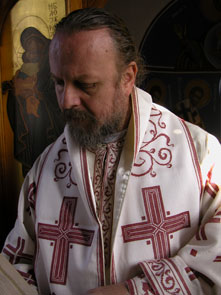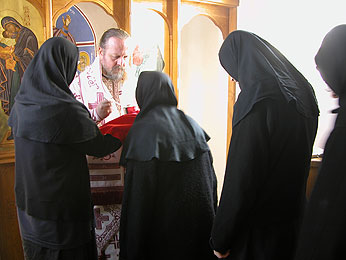Have Faith in God… ( 02.01.2008 )
On the feast of the Holy Hieromartyr Ignatius the Godbearer, in the monastery of Venerable Maximus the Confessor and Saint Gregory Palamas in Star Dojran, on the occasion of eighteenth anniversery of his tonsure, Metropolitan Nahum of Strumica celebrated Divine Liturgy.
After reading the Gospel, the Bishop said the following:
Have faith in God. For verily I say unto you, That whosoever shall say unto this mountain, Be thou removed, and be thou cast into the sea; and shall not doubt in his heart, but shall believe that those things which he saith shall come to pass; he shall have whatsoever he saith. Therefore I say unto you, What things soever ye desire, when ye pray, believe that ye receive them, and ye shall have them. (Mark 11:23-24).
True are the words of the Lord that we just read, my children, but everything has an order of its own. For instance, this statement is in power and is only comprehensible if it is being read in the context of Christ’s complete evangelical teaching. It becomes even more comprehensible if it is being lived and explained within the frames of each of the degrees of spiritual development which we necessarily have to go through. Certainly, it will become most comprehensible if it is accomplished in our life through our deeds. It is one thing to know in which direction the goal lies, it is another to see the goal in the distance, and, finally, it is a completely different thing to reach the goal. It is one thing to have faith and trust in God, another is to have knowledge from illumination, and, finally, it is a completely different thing to have a perfect unity with Him. As holy apostle Paul states: For now we see through a glass, darkly; but then face to face: now I know in part; but then shall I know even as also I am known. (1 Cor. 13:12).
The two mentioned virtues, faith and prayer, ought to be correctly explained and understood if we desire to comprehend the Lord’s message in this Gospel reading. We will first talk about one very concrete aspect of prayer, and afterward about faith itself. With respect to prayer, we ought to see what exactly does it mean ‘what things soever ye desire’…
Within the context of the entire Gospel of Christ, in essence, prayer is never understood as asking, but instead as offering. The one who understands prayer as a request of a sort has not yet understood in Whom he believes and Whom he is seeking. We only seek Him in prayer, but we can find Him and receive only if we completely surrender ourselves to Him. So that, until we understand prayer as a complete giving we will never receive the One who has already given everything to us, above all, completely given Himself. We receive the Holy Spirit and the fullness of the grace at the very hour of our Baptism and the first Communion. We should understand our entire life, existence, and functioning even outside (if that could be said so) of the holy Eucharist as a giving to God, and as glorification. We are children of the Church and we can correctly function only in an ecclesiastical and thanksgiving, catholic and Eucharistic sense, only if we give.
At the first level of spiritual growth – purification of the heart from the passions, our life is in a significant measure under the influence of the passions and the demon connected to them. We can presume in what measure our prayer – through which most often our desires are expressed – could for that reason be erroneous. Thus the apostle states: Ye ask, and receive not, because ye ask amiss, that ye may consume it upon your lusts (James 4:3). The Godman Christ established in His Annunciation the proper order of demands: But seek ye first the
It is therefore very important, as we saw, to note the sequence that our ‘requests’ take in prayer. It is interesting to find that the most important ‘requests’ in prayer can immediately materialize, while the ‘tiny’ requests for our daily needs could not materialize at all, especially if they have become a priority and if they impede our spiritual growth. For instance, we can receive the Lord in prayer right away and enter into unity with Him (that no man can say that Jesus is the Lord, but by the Holy Spirit – 1. Cor. 12:3). If we first ask for money, happiness, health, success, marital partner, etc. we can lose the Lord, and along with Him lose everything else and find ourselves among the Gentiles.
Therefore take no thought, saying, What shall we eat? or, What shall we drink? or, Wherewithal shall we be clothed? For after all these things do the Gentiles seek, for your heavenly Father knoweth that ye have need of all these things. But seek ye first the kingdom of God, and His righteousness; and all these things shall be added unto you. (Matthew 6:25-33)
A gift for the faithful, who received first the King and the kingdom of Heaven, is to have other things from daily life added unto them. It never corresponds with their ethics to seek these things for themselves in prayer. It is an honor and joy for the faithful to share the things added unto them with the smallest of Christ’s brethren. It is our duty, as well as spiritual benefit, to pray for the health, joy, material goods and success of all the people, but not for ourselves, as we said, so that we do not become like the Gentiles. A gift from God is for the perfect ones to have these prayers for the others answered. As the holy Fathers say, the one who fulfills God’s will has his will fulfilled by God.
The word of the ones who have reached the level of deification is not only illuminating, but also miracle-working: it expels demons, cures the sick, moves mountains etc. As Christ states: I say to you, he who believes in Me, the works that I do he will do also; and greater works than these he will do (John 14:12). But, when the Lord speaks of the faith both in this and in the case of the moving of the mountain with the help of faith, He primarily thinks of the faith that arises from perfect unity with Him, and not of the simple initial faith in Him. It is one thing to have deeds that emerge from initial faith in Him, while it is another the miracles that emerge from perfect unity with Him. It is one thing to have faith, for example, with which man does his confession for the first time, and it is another to have such faith that a saint has prior to or after performing his first miracle.
Therefore, with simple faith and trust in God, and not in man, those who are at the level of purification of their hearts from the passions renounce the world, enter into absolute obedience and endeavor in the struggle of word-and-mind prayer. With illumined faith in God, those who are at the level of illumination of mind spend themselves in their love towards their enemies and in extended mind-and-heart prayer. And with perfect faith in God, those at the level of deification pray for all the people and heal their infirmities and illnesses.
Children, it is good to know this as well: Those who are at the level of illumination do not have a miracle-working word and power to heal those terminally ill of cancer, for example. Then, how can they successfully pray for them? Only if they state, in their prayer before God, that they are prepared to accept to take the terminal illness on themselves, instead of the one for whom they are praying…That does not mean at all that the illness would be transmitted on them, at least not immediately, and perhaps never, but it often means for the ill to be cured from the disease. It is part of their struggle of ascetic love towards every man.
And when ye stand praying, forgive, if ye have ought against any: that your Father also which is in heaven may forgive you your trespasses. But if ye do not forgive, neither will your Father which is in heaven forgive your trespasses. (Mark 11:23-26).
Gossiping, judging and condemning, lying and slandering are signs that the person who is doing that has not yet forgiven and does not forgive, that is, does not believe… Then, such man should not wonder why he does not have genuine prayer. The “Lord’s Prayer” is unacceptable before God if only one man was left out of our heart. The prayer “Lord Jesus Christ, have mercy on me” is powerless if we did wrong to one of the smallest brethren of His. To condemnation and delusion goes that prayer which is without faith, without repentance, without metanoia. Protect us, o Lord…!



